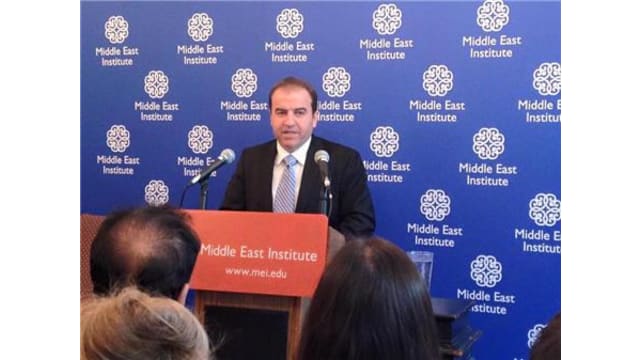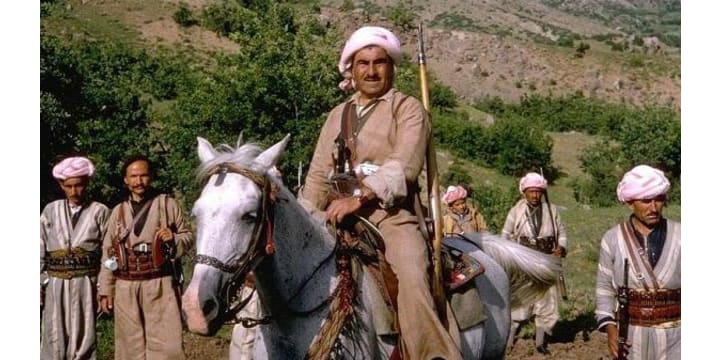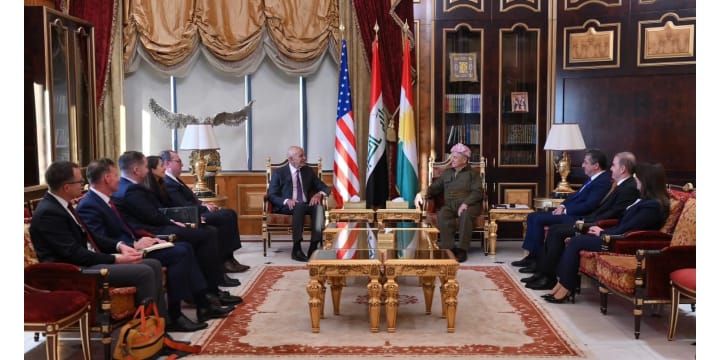
Hawrami presents a seminar at the Middle East Institute in Washington on the dynamics in Iraqi Kurdistan Region
I would like to thank you all for being here today with us, it is a great pleasure to be here and to discuss these important issues and I hope that I can cover it within 20 minutes, if I can make it short its end of Iraq and things are solved and it's not like that.
I will start by discussing the war on ISIS where we are and where we are heading to. All of you know what happened and how it happened and why it happened so, I would like to report to you that from all perspective this war is going to be a very long war, it's not going to be ended in the coming years because ISIS is the symptom of the illness not the illness itself. ISIS is the result and is the protact of the fail and the failing state in the Middle East.
We in the Iraqi Kurdistan region when ISIS attacked Kurdistan, we developed a three face strategy. The first one was to stop ISIS, the second one was to roll them back, and the third one is to destroy and defeat ISIS. I can proudly report to you that 100%, we managed to stop ISIS and we also managed to 95% roll them back to the areas that they occupied and we managed to liberate 20000 square kilometres from ISIS. Around the third place of the strategy to defeat and finally destroy ISIS, up to this moment we have lost 1225 brave Peshmergas in the fight against ISIS and we have 7000 wounded Peshmergas also. With all of that success from Iraqi Kurdistan Region as the real force from the ground to destroy and defeat ISIS. They gained Ramadi, they gained Palmyra, so it means that there is no comprehensive strategy to defeat and to work in a unanimous way to defeat ISIS everywhere and to have a a comprehensive, military and strategy plan against them. The other issue that we say is a continuous war, so far from August 2014 to July 2015 based on our information from Ministry of Peshmerga and from information from our partners, we have killed 11,000 ISIS in the war with Peshmergas with the airstrikes and the face to face and the battlefield but within that space also they have received 10,500 new foreign fighters, it means that by also by not stopping the source of foreign fighters, this war is going to continue.
We need aircraft especially for transporting and for the medic evacuation helicopters; we need transportation tracks, so all of that, unfortunately this kind of support for the Iraqi Kurdistan for the peshmerga forces are in a very slow process and we need to extradite it. We need greater Special Forces engagements especially by targeting direct actions and by training of the Peshmergas. We need support to advice and mentoring to reform and to modernise Iraqi Kurdistan peshmerga forces to be a new capable partner with the United States with the other members of the global coalition against ISIS.
education with their hospitals with the other services that they need. Unfortunately Baghdad is hardly doing anything to support our government and to support their own citizens while in Iraqi Kurdistan region right now. The United Nations and the NGO are operating hand to mouth and they need more. These people need emergency care that we have in Kurdistan for the short term but in the long term ISIS must be solved and these people must return to their own original places. In this regard that's why the fight on ISIS, the burden of the IDP's and refugees Kurdistan needs more support.
forces in terms of budget and most recently in terms of the shipments of the ammunition that they need. They claim that they do not have enough cash but they have cash for PMU for the Popular Mobilisation Unit. Now, in Iraq we have approximately 150 different militia groups. 46 of them are well known, they have commands and their operational leaders are known their strategies are known and they receive $800 a month for every member of the Popular Mobilisation Unit, so there is money for them but there is no money for Peshmerga forces.
seeing right now.
democratic, constitutional Iraq, but unfortunately Iraq right now, we have representation in Baghdad but we do not have power sharing in Baghdad and we do not want to be part of an unknown future because we are responsible for the citizens of the future of our kids and we want to be part of the stability and to keep Kurdistan Region within that instability that we have in the area.
So, for the other Kurdish issue, as you may be aware that right now in Iraq Kurdistan domestically, we are in the negotiation process concerning the term of President Masoud Barzani and how the Kurdish political parties are going to solve this issue in Iraqi Kurdistan. But, I would like to give you a brief background about where we were in this issue, where we are right now and where we are heading to.
As you know in 2003, we had an election in Kurdistan region and we in KDP we won the elections and we have 38 seats in the parliament. We could have easily formed a government without the change movement in Kurdistan. We could have easily secured 57 seats in the parliament and to form the majority government. But we strategically made that decision that this is time for Kurdistan to have a broad base national unity government that is why we approached the change movement who have 24 seats in the parliament with the others that all collectively to go through this critical time of our history.
President Masoud Barzani was elected in 2005 by the Iraqi Kurdistan
constitution then to have the election for the President based on the constitution. Unfortunately, the current Parliament, they could not make that constitution to be passed within that year, that is why we approached to this moment and in this moment, President Barzani did his legal obligation by calling for an election 60 days before the end of his term. So, he called for an election to be held on August 20th, 2015. But the
referendum for the sole determination for the Kurdistan region. If the other political parties do not agree on that four years then we ask them to extend President Barzani's term to the end of the current term of the current Parliament, it means until 2017. If not then this is one of the suggestions we are going to call for an early Parliament election in
Kurdistan and the Government to resign and then based on what the Political Party say, the majority, minority then at that time we can do both the Presidential and Parliamentary election.
but we want their unity and as you know militarily and diplomatically sending Peshmergas to Kobane and opening up diplomatic relations for PYD is the genuine effort from us, the Kurdistan leadership that we want Syrian Kurds to develop their cause within the Syrian Revolution but our condition for them is their unity. So with this unity, I will end my speech.
Thank you
Rush transcription of the speech
http://www.mei.edu/events/dynamics-iraqi-kurdistan
Transcribed by Kurdistan Democratic Party‘s FRO communications

